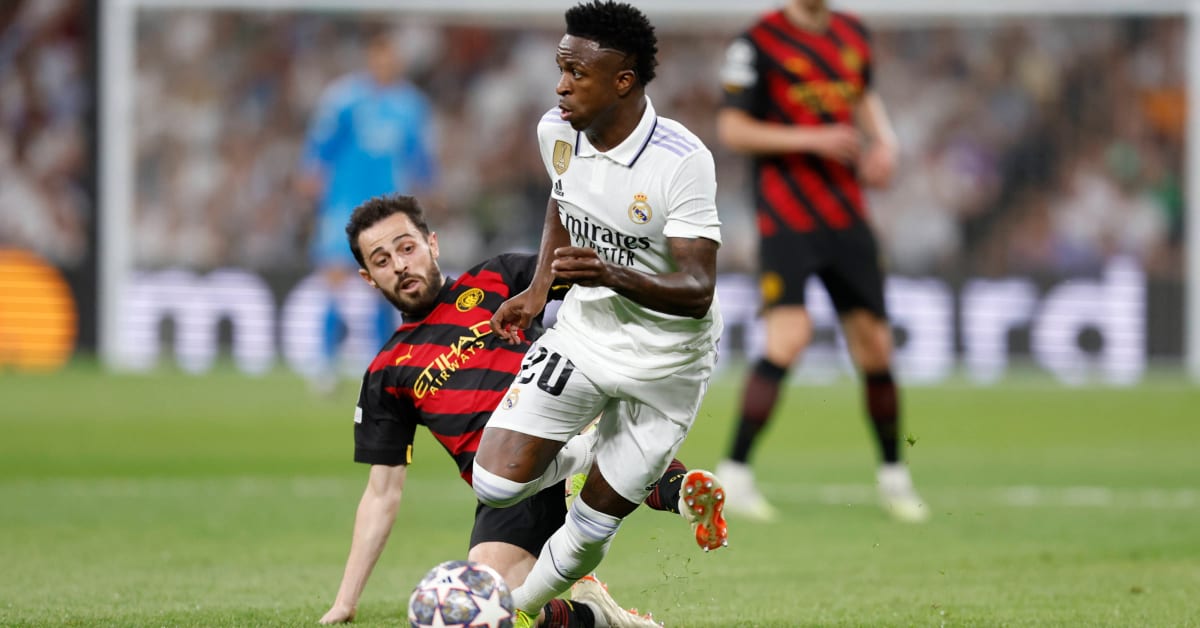Man City, Real Madrid Stalemate Sets Up the Final Before the Final in Champions League
Football is a game that plays tricks on the mind. It offers narrative paths that you think you’ve seen before and then, just as you think you know the destination, turns off on a different route. Real Madrid against Manchester City was billed as the final before the final, and lived up to that billing for quality, both of the play and the two goals. And it was tight, a 1–1 draw that leaves the semifinal to be settled in the second leg next week.
And yet it didn’t look it would be tight, at least at the start. But then that in itself is not uncommon. The first half felt very familiar. There was City dominating possession, playing in neat filigrees, always probing, always working the opposition, grinding it slowly down by process of attrition. And there was Madrid resisting, holding out, often not looking particularly good, but never panicking. The self-belief that carried it to the title last season remains as unshakeable as ever.

Vinícius Júnior was a major force for Real on Tuesday, but Man City later countered his opening goal.
IMAGO/Lagencia
At the halfway point of the first half, City had managed 72% possession, a statistic down only in part to its own excellence; Madrid also gave the ball away a lot, which in turn was partly down to City’s press. The Bernabéu crowd was unhappy, whistling as the ball rolled from City foot to City foot, but Madrid remained unfazed.
But the opening goal didn’t come for City. Madrid began to launch counter-thrusts of its own, almost always through Vinícius Júnior, who stayed high up the pitch throughout, almost daring Kyle Walker to get forward and join the attack. And then, in the 36th minute, the opener came—and in a twist that almost felt predictable, it went to Madrid.
Eduardo Camavinga began the move from left back, surging forward and exchanging a silken one-two with Luka Modrić before slipping the ball inside to Vinícius. The Brazilian’s first touch was good and his subsequent shot remarkably powerful, flashing past Ederson from outside the box. It was Madrid’s only shot of the first half, while City had six before halftime. Typical Madrid; typical City.
And typical Pep Guardiola. Erling Haaland was supposed to change that. He is a striker who has scored 51 goals in all competitions this season, shattering records almost every week and, more than that, his directness has given City an additional option. Yet his involvement was limited—one off-balance shot, a decent header for which he was stretching, an effort blocked by David Alaba. Antonio Rüdiger at least was closer to matching him physically than most defenders are, and Haaland didn’t deal with it well. It’s one game and it would be wrong to draw conclusions prematurely, but amid everything else, it will be a concern that the great striker did not seemingly add the additional edge in a major European game that City had hoped he would.
For a long time, the game seemed to be following the pattern of the 2014 semifinal between Madrid and Bayern, when Carlo Ancelotti and Guardiola first faced each other as managers. That night, Bayern bossed possession only to fall behind to Madrid’s first effort, at which the game settled to Bayern probing and Madrid counters. Madrid ended up winning 1–0 and then hammered Bayern 4–0 in Munich.
Whether because of the goal, or the heat, or a sense of anxiety having failed to make its early advantage tell, City was never quite as dominant again. Indeed, Madrid had begun to look the more dangerous side when Camavinga’s pass was intercepted by Rodri after 67 minutes. Jack Grealish advanced it and the ball was then laid off by İlkay Gündoğan to Kevin De Bruyne, who hit the ball even harder than Vinicius had, so it fizzed past Thibaut Courtois having risen no higher than three feet off the ground.
Which leaves the tie perfectly posed ahead of the second leg. These are players and managers who know each other well. There were few surprises here. City did control possession. Madrid was a constant threat, at times almost despite itself. Vinícius was a major danger. Rodri excelled, Modrić always threatened to unlock the game with a deft touch. City continues, in Europe, never quite to be as successful as its play makes it appear it should be. Madrid continues to get results despite being outplayed for long spells, a psychological sleight of hand that somehow bolsters itself while unnerving opponents. Haaland, at some point, will surely have a role to play.
It was intriguing rather than thrilling, but it was only the first act; the drama will come in the denouement at the Etihad next Wednesday.







